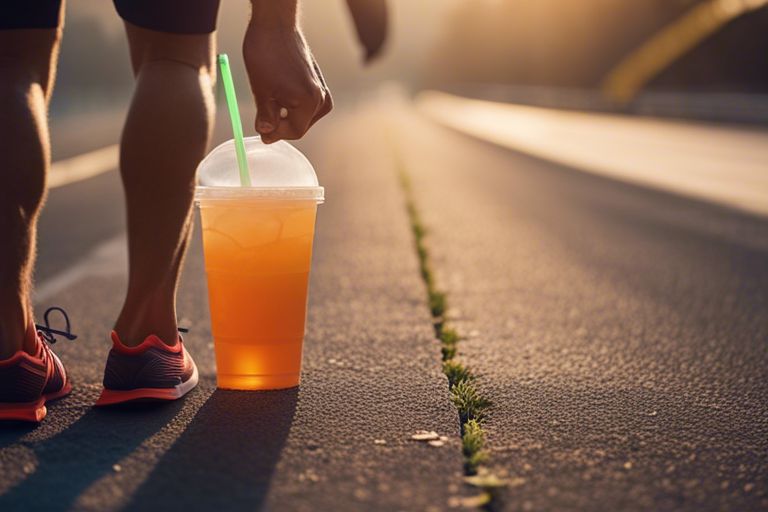After a refreshing jog, it’s crucial to pay attention to what you refuel your body with. While it’s tempting to indulge in certain foods post-run, some choices can hinder your progress and hinder your recovery. In this informative blog post, we will probe into the key nutrition mistakes to avoid after a run to ensure that you maximise the benefits of your exercise and support your body’s recovery process. By making informed choices about your post-run nutrition, you can enhance your performance, avoid common pitfalls, and keep your body in top form for your next run.
Key Takeaways:
- Avoid sugary drinks: It’s important to avoid sugary drinks like sodas and energy drinks after a run as they can lead to dehydration and undo the benefits of your workout.
- Avoid high-fat foods: Steer clear of high-fat foods like fast food or fried food after a jog, as they can slow down digestion and leave you feeling sluggish.
- Avoid excessive alcohol: Drinking alcohol after a run can dehydrate the body and hinder the muscle recovery process, so it’s best to limit your intake.
- Avoid processed snacks: Opt for whole foods over processed snacks like chips or biscuits, as they provide better nutrients for muscle recovery and overall health.
- Avoid heavy meals: Eating heavy meals immediately after a run can cause bloating and discomfort, so try to wait at least an hour before having a balanced meal.
Understanding Post-Run Nutrition
The Role of Nutrients After Jogging
After a strenuous run, it is crucial to replenish your body with the right nutrients to aid in recovery and refuel your energy stores. Key nutrients to focus on include carbohydrates to restore glycogen levels, protein to repair and build muscle tissues, and electrolytes to replace those lost through sweat.
Timing of Post-Run Meals and Snacks
Timing plays a vital role in post-run nutrition. It is recommended to consume a balanced meal or snack containing carbohydrates and protein within 30 minutes to 2 hours after your run. This window of time is when your body is most efficient at replenishing glycogen stores and repairing muscle tissues.
Foods and Substances to Avoid Post-Jogging
Processed Sugars and Unhealthy Fats
Avoid consuming foods high in processed sugars and unhealthy fats after a run, as they can undo all your hard work. Items such as pastries, crisps, and sugary drinks can lead to inflammation and hinder muscle recovery. Opt for whole, nutritious foods instead to replenish your energy stores and support muscle repair.
Alcoholic and Caffeinated Beverages
It’s best to steer clear of alcoholic and caffeinated beverages post-jogging. Alcohol can dehydrate you, disrupt your sleep, and interfere with muscle recovery. Caffeine, on the other hand, can elevate your heart rate and have a diuretic effect, leading to further dehydration. Stick to water or herbal teas to rehydrate effectively after your run.
Hydration and Electrolyte Balance
The Importance of Proper Hydration
Hydration is crucial for optimal performance and recovery after a run. Water is necessary for regulating body temperature, transporting nutrients, and lubricating joints. Dehydration can lead to decreased athletic performance, muscle cramps, and even heat exhaustion. It is recommended to drink water before, during, and after your run to maintain proper hydration levels.
Recognizing and Avoiding Dehydrating Agents
Avoiding dehydrating agents such as alcohol and caffeine is vital for maintaining hydration levels. These substances have diuretic effects, causing increased urine production and potentially leading to dehydration. It’s best to limit their consumption, especially after a run, to prevent further fluid loss and electrolyte imbalance.
Additionally, salty foods can also contribute to dehydration as they can make you feel thirstier and prompt you to drink more, leading to an imbalance in fluid levels. It’s important to be mindful of your intake of dehydrating agents to support proper hydration post-exercise.
Smart Eating Habits for Recovery
Emphasizing Macronutrient Ratios
After a vigorous run, it’s vital to focus on replenishing your body with the right macronutrients in order to aid recovery. Emphasising the correct balance of carbohydrates, proteins, and fats is key to supporting muscle repair, glycogen replenishment, and overall energy levels. Aim for a ratio that suits your individual needs, for example, a combination of complex carbs, lean proteins, and healthy fats to optimise recovery and enhance performance.
Choosing Quality Whole Foods
Opting for whole, unprocessed foods post-run is imperative for providing your body with the necessary nutrients it needs to recover efficiently. Fresh fruits and vegetables, whole grains, lean meats, and plant-based proteins are excellent choices to support muscle repair and reduce inflammation. Avoid processed foods, sugary snacks, and unhealthy fats, as they can hinder your recovery process and leave you feeling sluggish.
By selecting quality whole foods that are rich in vitamins, minerals, and antioxidants, you can give your body the fuel it needs to bounce back after a challenging workout. Look for natural, nutrient-dense options that will nourish your body and promote optimal recovery.
Jogging and Nutrition – What to Avoid After a Run
It is important to pay attention to what you consume after a run to support your body’s recovery and performance. Avoiding high-fat, high-fibre, and spicy foods can help prevent stomach issues and promote digestion. Additionally, steering clear of sugary drinks and processed snacks can aid in replenishing your energy levels effectively. Opting for a balanced meal rich in carbohydrates, proteins, and hydration can enhance your post-run recovery and keep you on track with your fitness goals. By making mindful nutrition choices after jogging, you can optimise your performance, support muscle repair, and feel your best for your next run.
FAQ
Q: What should I avoid eating after a run?
A: After a run, it is best to avoid foods high in fats and sugars, such as fast food, fried foods, and sugary snacks. These can undo the benefits of your workout and slow down your recovery process.
Q: Is it advisable to consume alcohol after a run?
A: It is recommended to avoid consuming alcohol after a run as it can dehydrate your body and hinder the recovery process. Opt for water or a sports drink to rehydrate instead.
Q: Should I eat a heavy meal right after a run?
A: No, it is not advisable to eat a heavy meal immediately after a run. Your body needs time to cool down and digest food properly. Instead, opt for a light and balanced snack to replenish your energy levels.
Q: Can I indulge in sugary drinks post-run?
A: It is best to avoid sugary drinks post-run as they can cause a spike in blood sugar levels and lead to a crash later on. Stick to hydrating with water or natural fruit juices instead.
Q: Is it okay to skip post-run nutrition altogether?
A: No, it is important to refuel your body after a run to aid in recovery and replenish energy stores. Skipping post-run nutrition can prolong muscle soreness and delay the recovery process. Aim for a balanced snack or meal within an hour of finishing your run.






